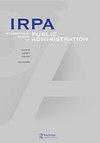组织所有权和技术效率的定量元分析:非营利性和营利性医疗保健提供者的设施类型和时间的非线性影响
International Review of Public Administration
Pub Date : 2020-04-02
DOI:10.1080/12294659.2020.1775330
引用次数: 1
摘要
本研究旨在确定营利性医疗机构是否比非营利组织在技术上更有效率。我们试图回答两个问题:医院和养老院的技术效率是否因所有制类型而异?如果是这样,时间是如何调节所有权和技术效率之间的关系的?我们的研究结果并不表明营利性医疗机构普遍比非营利性医疗机构技术效率更高。然而,营利性养老院在技术上比非营利机构更有效率,而在医院中,非营利机构和营利性机构之间没有区别。对医疗设施的检查显示,非营利机构最近才变得有效率,而营利性组织在过去更有效率。总之,根据组织的所有权和设施类型,美国医疗保健服务系统的制度变化发展不同。建议在市场和人口方面将理论和实践考虑作为医疗保健实践的政策工具,以提高技术效率。本文章由计算机程序翻译,如有差异,请以英文原文为准。
A quantitative meta-analysis of organizational ownership and technical efficiency: non-linear influence by facility types and time for nonprofit and for-profit healthcare providers
ABSTRACT This study seeks to determine if for-profit healthcare organizations are more technically efficient than nonprofit organizations. We attempted to answer two questions: Does the technical efficiency of hospitals and nursing homes vary depending on ownership type? If so, how does time moderate the relationship between ownership and technical efficiency? Our findings do not show that for-profit healthcare providers are universally more technically efficient than nonprofit healthcare facilities. However, for-profit nursing homes are more technically efficient than nonprofit facilities, while there was no difference between nonprofits and for-profits in hospitals. An examination of healthcare facilities reveals that nonprofit institutions have only recently become efficient, while for-profit organizations were more efficient in the past. In conclusion, institutional changes in the healthcare delivery system of the US developed differently, depending on organization’s ownership and facility types. Theoretical and practical considerations were recommended as a policy tool in healthcare practices in terms of market and population for technical efficiency.
求助全文
通过发布文献求助,成功后即可免费获取论文全文。
去求助
来源期刊

International Review of Public Administration
Social Sciences-Public Administration
CiteScore
2.00
自引率
0.00%
发文量
21
期刊介绍:
The International Review of Public Administration (ISSN 1229-4659) is published biannually by the Korean Association for Public Administration (KAPA) to provide a worldwide audience with the opportunity for communication and further understanding on issues of public administration and policy. There will be a triple-blind peer review process for all submissions of articles of general interest. There are no particular limitations on subject areas as long as they are related to the field of public administration and policy or deal with public employees. Articles should be analytic and demonstrate the highest standards of excellence in conceptualization, craftsmanship, and methodology.
 求助内容:
求助内容: 应助结果提醒方式:
应助结果提醒方式:


